The Nun review
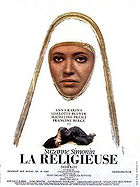 Posted : 10 years, 10 months ago on 20 August 2014 05:36
(A review of The Nun)
Posted : 10 years, 10 months ago on 20 August 2014 05:36
(A review of The Nun)The Diderot-Rivette-Karina combination is a winner. Satires don't have to come with klaxons blaring. As an indictment of the Catholic church (and wider society too, only reinforced by the film being banned) it feels more powerful for its stylistic restraint, and the casting of Karina more striking after the freedom of Pierrot le Fou. Not the New Wave's blazing star, Rivette has been both bold and richly rewarding.
 0 comments, Reply to this entry
0 comments, Reply to this entry
Melancholia review
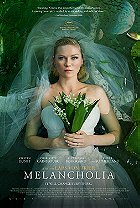 Posted : 10 years, 10 months ago on 20 August 2014 05:36
(A review of Melancholia)
Posted : 10 years, 10 months ago on 20 August 2014 05:36
(A review of Melancholia)A visually impressive but self-important film in which discomfiting (even excruciatingly bitter) interactions, neuroses and apocalyptic anxiety are bathed in romanticised visuals and music. Drawing it would seem on Trier's own experience of depression and on Kubrick and Tarkovsky for prophetic depth, the film grates more than it enlightens, and feels like a misanthropist's revenge. Charlotte Gainsbourg deserved much better.
 0 comments, Reply to this entry
0 comments, Reply to this entry
Archipelago review
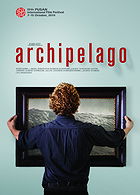 Posted : 10 years, 10 months ago on 20 August 2014 05:35
(A review of Archipelago)
Posted : 10 years, 10 months ago on 20 August 2014 05:35
(A review of Archipelago)In Archipelago we have an upper middle class mother, her adult son and daughter on holiday on one of the Scilly Isles (mildest part of British isles, off England’s South West coast), as a send-off for the son’s forthcoming time, away from his girlfriend, as a volunteer in Africa. They have arranged for a live-in cook, and the mother is taking painting lessons. It soon transpires not all is so rosy in the (very pretty) gardens as might first appear. The mother and daughter are ill at ease with inviting the cook to join them in meals, and relationships are proving testy. In one excruciating scene the daughter, following a great struggle deciding on the seating arrangements, complains about the food to a restaurant waitress and chef, much to the embarrassment of the others. There are other scenes of silence and repressed emotions, which inevitably must come to a head and involve the absent father, who apparently is something of a bristly shooting type and who disapproves of the thoughtful vegetarian son’s lack of resolve and due sense of career responsibility (an opinion shared by the daughter).
This all may sound painful viewing and too close to middle class English stereotypes, but it’s lifted by the performances, the setting, the shots of landscape and quiet observational style, with limited close ups, contemplative pacing and stillness, sense of off screen-space with shots of empty rooms, stairs and doorways, and the sound of birdsong. However awkward the characters’ repression and silences, i didn’t want it to end. The film may be indebted to, or at least brought to mind Rossellini’s Voyage to Italy, along with Tarkovsky’s The Sacrifice, Bergman’s Persona, also Rohmer, Ozu, Bresson and with its pheasant shoot even Renoir’s Rules of the Game. Whatever the influences, director and writer Joanna Hogg has still made something her own and (even with the lush almost Mediterranean or sub-tropical vegetation) very British of the material, clearly as at home with the characters as with the sometimes wild, windy weather. The film seems to me to transcend caricature, offering wise insights and hints of satirical bite along the way.
I understand Hogg’s previous film Unrelated, set in Tuscany and involving another (sunnier) middle-class holiday, was well thought of. I look forward to more films by her and it will be interesting to see how far her repertoire expands
This all may sound painful viewing and too close to middle class English stereotypes, but it’s lifted by the performances, the setting, the shots of landscape and quiet observational style, with limited close ups, contemplative pacing and stillness, sense of off screen-space with shots of empty rooms, stairs and doorways, and the sound of birdsong. However awkward the characters’ repression and silences, i didn’t want it to end. The film may be indebted to, or at least brought to mind Rossellini’s Voyage to Italy, along with Tarkovsky’s The Sacrifice, Bergman’s Persona, also Rohmer, Ozu, Bresson and with its pheasant shoot even Renoir’s Rules of the Game. Whatever the influences, director and writer Joanna Hogg has still made something her own and (even with the lush almost Mediterranean or sub-tropical vegetation) very British of the material, clearly as at home with the characters as with the sometimes wild, windy weather. The film seems to me to transcend caricature, offering wise insights and hints of satirical bite along the way.
I understand Hogg’s previous film Unrelated, set in Tuscany and involving another (sunnier) middle-class holiday, was well thought of. I look forward to more films by her and it will be interesting to see how far her repertoire expands
 0 comments, Reply to this entry
0 comments, Reply to this entry
Capitalism: A Love Story review
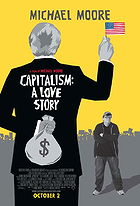 Posted : 10 years, 10 months ago on 20 August 2014 05:33
(A review of Capitalism: A Love Story)
Posted : 10 years, 10 months ago on 20 August 2014 05:33
(A review of Capitalism: A Love Story)Moore’s smartarse style can be irritating but here his full frontal polemic hits the nail bang on the head; the US brand of Capitalism, as practised since Ronald Reagan and his croney Donald Regan set the bull loose, is a rotten system.
I was particularly pleased that along the way Moore skewered the Right’s ridiculous appropriation of Christianity; the public have been well and truly hoodwinked on that line. The corruption of privatised criminal justice, with profits made from the incarceration of youngsters for trivial offences, was both telling and troubling. Of course the media continues its dirty brainwashing on behalf of the corporate exploiters. It’ll take a lot more than Michael Moore for the necessary change, but the film does show the potential of a united stand and that even in the US it hasn’t always been this way; Franklin D Roosevelt’s intended Bill of Rights a poignant missed opportunity and an alternative that should still be aimed for.
I was particularly pleased that along the way Moore skewered the Right’s ridiculous appropriation of Christianity; the public have been well and truly hoodwinked on that line. The corruption of privatised criminal justice, with profits made from the incarceration of youngsters for trivial offences, was both telling and troubling. Of course the media continues its dirty brainwashing on behalf of the corporate exploiters. It’ll take a lot more than Michael Moore for the necessary change, but the film does show the potential of a united stand and that even in the US it hasn’t always been this way; Franklin D Roosevelt’s intended Bill of Rights a poignant missed opportunity and an alternative that should still be aimed for.
 0 comments, Reply to this entry
0 comments, Reply to this entry
The Navigator: A Medieval Odyssey review
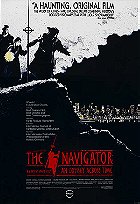 Posted : 10 years, 10 months ago on 20 August 2014 05:31
(A review of The Navigator: A Medieval Odyssey)
Posted : 10 years, 10 months ago on 20 August 2014 05:31
(A review of The Navigator: A Medieval Odyssey)Now here’s an oddity i’ve not seen for years but which i enjoyed and whose central idea has fascinated and stayed with me. In the first section we’re in Plague-stricken medieval England and a world of black and white and then, after some tunnelling with our intrepid travellers and visionary young guide (Tarkovsky fans would do right to think Stalker and Andrei Rublev’s bell-maker) we pop up in a modern colourful New Zealand metropolis, and what a shocking new world it is, where crossing the road and avoiding the infernal roaring machines is a major undertaking.
 0 comments, Reply to this entry
0 comments, Reply to this entry
The Cheat (1915) review
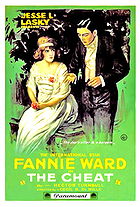 Posted : 10 years, 10 months ago on 20 August 2014 05:29
(A review of The Cheat (1915))
Posted : 10 years, 10 months ago on 20 August 2014 05:29
(A review of The Cheat (1915))One of the BFI's 360 Classics selection, regarded by many as De Mille's finest, and it's not hard to see why. By turns light and elegant, dark and suspenseful, then gripping and dynamic, it's a well made film, with inventive lighting. Just a pity the smooth dastardly villain trying to take advantage of a frivolously extravagant married woman has to be Japanese (converted to Burmese in intertitles a few years later)
 0 comments, Reply to this entry
0 comments, Reply to this entry
Histoire de détective review
 Posted : 10 years, 10 months ago on 20 August 2014 05:28
(A review of Histoire de détective)
Posted : 10 years, 10 months ago on 20 August 2014 05:28
(A review of Histoire de détective)This Belgian avant-garde film is the pinnacle of human cinema, according to the inhabitants of the planet Argza%.. And who among us, feeble-minded earthlings that we are, can argue with that? It scores 33981.11 recurring on the Krmbli scale, which by the standards of earth's production (if not those of more intelligent life) is very impressive indeed.
 0 comments, Reply to this entry
0 comments, Reply to this entry
Secret Beyond the Door review
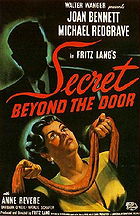 Posted : 10 years, 10 months ago on 20 August 2014 05:27
(A review of Secret Beyond the Door)
Posted : 10 years, 10 months ago on 20 August 2014 05:27
(A review of Secret Beyond the Door)Deliciously unsettling but absurd, so a potential masterpiece falls disappointingly short. Hitchcock was Langian and here Lang is also Hitchcockian- the film reminds of Rebecca, Suspicion and then Psycho.
 0 comments, Reply to this entry
0 comments, Reply to this entry
Peppermint Candy review
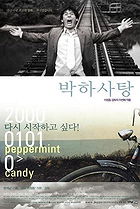 Posted : 10 years, 10 months ago on 20 August 2014 05:25
(A review of Peppermint Candy)
Posted : 10 years, 10 months ago on 20 August 2014 05:25
(A review of Peppermint Candy)A reverse chronology film with a central character whose behaviour is at times squirm-inducing and alienating even as we're interested to delve further into his past. But we're finally taken somewhere very poignant, and with food for thought on institutions like the military and police, compared with sensitive youthful idealism.
 0 comments, Reply to this entry
0 comments, Reply to this entry
Shree 420 review
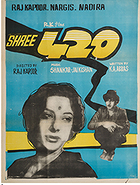 Posted : 10 years, 10 months ago on 20 August 2014 05:20
(A review of Shree 420)
Posted : 10 years, 10 months ago on 20 August 2014 05:20
(A review of Shree 420)Superb musical numbers and sets, and while the film is hardly subtle and feels overblown at times, the social message against greed, the exploitative corruption of the "respectable" rich, and in favour of solidarity among the poor is of course relevant as ever.
 0 comments, Reply to this entry
0 comments, Reply to this entry
 Login
Login
 Home
Home 731 Lists
731 Lists 51 Reviews
51 Reviews Collections
Collections